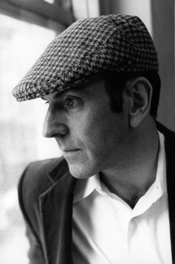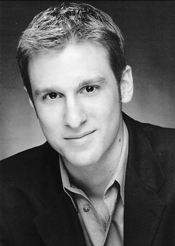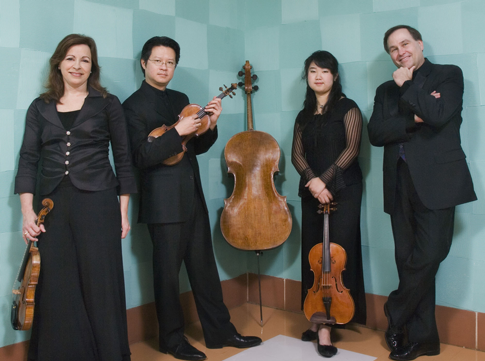
22 Jul 2008
Gordon creates masterpiece in “Green Sneakers”
Eugenia Zukerman asked for a 10-minute chamber work — a piano quintet, perhaps — and she got Green Sneakers for Baritone, String Quartet and Empty Chair, which lasts exactly an hour.
“Quelle plaisir” to encounter Gustave Charpentier’s seldom performed “Louise” at the Paris Opera in a production where most everything went spectacularly right.
The Bayerische Staatsoper, based in three spectacular houses where Mozart, Wagner and many other composers premiered their works, presents over 300 annual performances to a discerning public.
Bernd Alois Zimmermann was a sensitive, none too healthy 21-year-old music prodigy in 1939, when he was drafted into the German army.
For Sir William Walton, the protracted genesis of Troilus and Cressida must have seemed more akin to the agonies of Sisyphus than to the composition of an opera.
Originating at the Châtelet, where the narration was given in French, Robert Carsen's staging of Bernstein's unique satire worked rather well in its television broadcast from the Parisian house late in 2006.
The disastrous 1904 La Scala premiere of Giacomo Puccini’s Madame Butterfly is one of those famous annals of opera which tend to leave today’s audiences perplexed about all the uproar.
The concert “20th-Century Masters,” presented by the Grant Park Music Festival, Chicago on 27 and 28 June 2008 featured several pieces performed for the first time under the auspices of the Festival.
David Gockley heard the cries of many an opera fan that Pamela Rosenberg had denied them their 'stars,' so for his summer season, 2008, he brought them Natalie Dessay, Susan Graham, Ruth Ann Swenson, and Stefan Margita.
My visit to two rarely mounted pieces at the Opera Festival of St. Louis brought to mind the little girl with the curl, for when it was good, it was very very good and when it was bad, it was, um. . .er. . .
In the latter part of last year, the casting for Nicholas Hytner’s new production of Don Carlo — in the five-act Italian version — looked to be on shaky ground.
No one has ever called Gazzaniga’s Don Giovanni an overlooked masterpiece.
Pink flamingos, sheep on wheels, and a queen crowned with giant antlers all inhabit the zany world of Opera Theatre of Saint Louis’s Una cosa rara, where the artificial 18th century pastoral commingles with cutesy country colors and 1950s yard art.
On the barren stage: a few chairs, a dark-gold hectoplasm projected on the wood panels of the acoustic chamber - nothing more.
For the belated Spanish premiere of Britten’s Death in Venice, 35 years after its creation in Aldeburgh, Barcelona seems a felicitous choice.
For Bellini’s “I Capuleti e i Montecchi,” Paris Opera peopled its revival with plenty of star power.
When the Ringling Brothers folded their tents, opera took over. Aïda with elephants, and Walküre with real horses.
It is a bit hard to know what to make of Olivier Messiaen’s colossal piece “Saint François d’Assise,” beautifully mounted by Netherlands Opera.
If you are going to produce Jacques Fromental Halevy’s forgotten opera “Clari,” I urge you to first make sure you have a signature on the contact from a superstar with the firepower of Cecilia Bartoli.
It is worth remembering that prior to the première of Strauss’s opera in 1911, the working title was ‘Ochs auf Lerchenau’.
At the curtain call for the first night of WNO’s new production of the infrequently performed Khovanshchina director David Pountney wore a simple Russian shirt.

Eugenia Zukerman asked for a 10-minute chamber work — a piano quintet, perhaps — and she got Green Sneakers for Baritone, String Quartet and Empty Chair, which lasts exactly an hour.
She was delighted — as were all those who heard the world premiere of “Sneakers” at Colorado’s Bravo! Vail Valley Music Festival on July 15.
“I met Ricky two years ago,” says Zukerman, who as its artistic director had invited Gordon to be 2008 composer-in-residence at the Festival. “I had heard his Orpheus & Euridice, and he wrote me a flute obbligato for several of his songs. I was eager to have him in Vail and to commission a new work by him.”
In September, however, Gordon called Zukerman; he said he was working on a big piece and could not stop. “He read me the poems that were the libretto for the work,” Zukerman says. “They were gripping. I told him we would do it!”
Zukerman first contacted Gordon about a year ago, when he was in Salt Lake City for the second production of his opera The Grapes Of Wrath. At the time she suggested collaboration with the Miami String Quartet, an ensemble with a long Vail association. Gordon remembered a set of poems that he had written following the AIDS death of his long-time companion Jeffrey Grossi in 1996. He saw a new score taking shape on stage around an empty chair.
“I had a sense of the atmosphere that the work would have,” says the composer, who goes on to explain the title. There was a day after Jeffrey’s death when I was staring into our closet from the vast desolation of our bed,” he says. “These sad little green sneakers suggested a text about the day we bought them together. It poured out of me and ended up a cycle of poems that tells the story of that day and the period after it — all the way up to Jeffrey’s death.”
 Jesse Blumberg
Jesse Blumberg
Gordon knew that the vocalist for Sneakers had to be Jesse
Blumberg, the baritone who had created the role of Connie Rivers, the wayward
husband of Steinbeck’s pregnant Rosasharn, for the premiere of
Grapes a year earlier at Minnesota Opera. “In watching rehearsals
of Grapes I noted Jesse’s artistry — his charisma, his honesty and his
simplicity as a performer,” Gordon says. “Because of the honesty and
intimacy of these poems I knew that a performer who was false in any way
would kill Sneakers. It had to be a singer who was essentially an
open vessel. Jesse is like that with his unusual combination of strapping
casual masculinity and comfort in his own body. He’s unsaddled by any kind
of ego that gets between him, the music he is singing and the words he is
conveying.”
Gordon sent Blumberg the texts and asked whether he would be willing to perform Sneakers. “He wrote back almost immediately that he would be honored,” the composer says. “I am honored to have him.”
Gordon compares Blumberg with veteran mezzo Frederica Von Stade. “Like her, Jesse has a quality that many great singers have.” he says. “It is the inability to sing a single note without imbuing it with his entire personality, his opinion about life. Each note screams with life and dances.”
Green Sneakers originally ended with “Provincetown,” a poem that documents Gordon’s search for others who had survived the loss of a lover. But, once at work on the new score, he added as an epilogue “Sleep,” a poem (or lullaby) that he had once written for Grossi as a birthday gift. “I wanted to end the piece with a lullaby,” Gordon says, “and with a celebration of what we had together.” Grossi’s death is an experience that the composer had treated in his 2005 song cycle Orpheus & Euridice.
In Sneakers, however, the objectifying veil of myth is absent. Here Gordon faces Death head-on. The immediacy of the first person makes the narrative overwhelmingly direct. “I have questioned whether this was the right thing to do — to tell a story this baldly and to expose myself and my life with Jeffrey this way,” the composer says. “And my explanation is that after Jeffrey died I sought solace in reading everything I could find about grief. I was grateful to those who were generous enough to reveal in great detail the ways in which they endured loss and bore their own tragedies. So maybe there is a sense of mission here. Perhaps others have gone through what I went through and this might bring them some peace, identification, or understanding.”
 Miami String Quartet (Photo by Paul McGuirk)
Miami String Quartet (Photo by Paul McGuirk)
It is amazing that in this his first work for string quartet Gordon has
perfected an idiom that goes to the edge of tonality to create a microcosm of
pain and despair that has all the markings of a contemporary
Gesamtkunstwerk. Indeed, at the premier, members of the Miami String
Quartet were no longer mere strings, but humanized voices that formed a
seamless dramatic unity with Blumberg. Yet, despite its obvious personal
intensity, Sneakers is in no way confessional.
Like Orpheus, but in its own way, the new work elevates its contents to the level of universality. There is nothing of “letting it all hang out” in the score. Gordon locates models in Handel’s cantata Lucretia and in Britten’s Phedre, pieces where one singer tells and lives the story simultaneously. Because of its intimacy I approached the story in a ‘classical’ way with a prologue, an epilogue and interludes throughout,” he says. “That not only gives the listener time to think and reflect, but also gives the performer space to gear up for the next event. Even the use of a string quartet felt like a slightly distancing formal device.”
Praised for his Monteverdi and Bach, Blumberg at the premiere made this story his own, singing with a richly nuanced voice and, at 29, the stage presence of a veteran actor. In the most wrenching moment of Sneakers he went to the piano and played a phrase before turning to the epilogue of Gordon’s libretto. “This introduces the epilogue,” Gordon says. “In the score, there are two versions. One is very easy, essentially for two fingers, which any singer could play. The strings come in softly under the piano and take over when the singer leaves the keyboard. There’s the harder version, which is the one Jesse bravely opted for. He played the introduction to the epilogue, which, if the singer had no piano skills, would be hard, but luckily, with Jesse, you get everything. That’s why I hope it is he who does many productions of this piece, because along with being a wonderful singer and artist, he is brave!”
On the printed page Sneakers is a traditional song cycle: 14 free-verse poems plus two instrumental sections. The total absence of stage directions calls for a director, whom Gordon found for the premiere in Jonathan Solari, whose previous experience has been largely in spoken theater. “It was my job to support what Ricky had written,” says Solari, who went to work on the piece with Blumberg in Gordon’s New York apartment weeks before coming to Vail. We pushed the furniture aside and sat down with the music to develop a staging that peers into the soul of the narrator,” he says. Solari focused on having Blumberg interact with the string quartet and he wanted the audience to have an image of Jeffrey in the vacant chair on stage.
Where does Sneakers leave Gordon, a dozen years after Grossi’s death? Is this closure? “No, it’s not closure,” the composer says, “but a kind of unbelievable fulfillment, as if I have made something out of an experience that was excruciatingly painful as well as exultingly joyous. For what kept me alive — and probably Jeffrey for longer than anyone expected him to live — was a tremendous love, for which I will always be grateful and treasure as my good fortune.”
With the repetition of “Sleep Dear,” the final words of Green Sneakers, one heard in Vail a distant echo of the “Ewig” that concludes Mahler’s monumental Abschied. For this is a song of today’s earth, a farewell lamentation that transcends death.
Wes Blomster